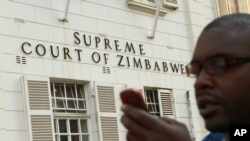The spokesman for Zimbabwe’s main opposition Movement for Democratic Change (MDC) says his group has evidence that senior ZANU-PF officials including the first lady contravened the constitution as well as the electoral laws in the run up to the July 31st general election.
“There is evidence that President Mugabe for example was dolling out gifts; teacups as well as teapots and so on, to supporters in return to votes. His wife was giving food stuffs and is on television and video,” said MDC spokesman Douglas Mwonzora.
He says the constitution as well as the country’s electoral law outlaws gift giving during elections.
Mwonzora says interim reports from both the African Union (AU) and the Southern African Development Community’s (SADC) poll observer groups support the MDC’s stance that the elections were not credible.
“In fact the reports of the African Union and SADC have actually made our case even stronger. In terms of their report the election was peaceful and free, but it was not fair,” said Mwonzora. “Our constitution is very clear that an election must be peaceful and free and fair. We have presented to them our dossier of the malpractices of this election.”
The main opposition party filed a petition last Friday challenging the electoral victory of President Mugabe and the ZANU-PF parliamentary majority win.
“The MDC is challenging principally on 15 grounds; the deposition of the voters role, disenfranchisement of the people of Zimbabwe as well as intimidation, and in some instances violence,” said Mwonzora.
Both the AU and the SADC poll observers described the Zimbabwe elections are free and peaceful. But while the AU said the general election was peaceful and harmonized, the SADC stopped short of calling it fair.
Mwonzora’s comments came after the MDC petitioned the constitutional court seeking to nullify the re-election of President Robert Mugabe and his ZANU-PF parliamentary majority win.
The constitutional court has to rule within 14 days after the petition was filed, according to the constitution.
“The chief justice will call the lawyers [this] week from both sides to see how this matter can be dealt with because it involves a lot of evidence,” said Mwonzora.
Citing the constitution, analysts, say it is unlikely Mr. Mugabe as well as members of parliament would be installed until the court hands down its ruling within the stipulated period.
“The MDC is not perturbed by the injustice of this case. We are saying we are putting this information to the court as well as to the public. But we are saying to the court that we want to see how unjust you can be,” said Mwonzora.
Some Zimbabweans say the prospects of the court challenge look bleak claiming the court and other state institutions including the security agencies are Mugabe sympathizers.
“We are aware of the odds against us but in this particular case the persons on trial are not the MDC, it is Robert Mugabe, the courts, the Zimbabwe electoral authorities. So what we are doing is we are putting before them insurmountable evidence and saying to them act in terms of the law,” said Mwonzora.
“There is evidence that President Mugabe for example was dolling out gifts; teacups as well as teapots and so on, to supporters in return to votes. His wife was giving food stuffs and is on television and video,” said MDC spokesman Douglas Mwonzora.
He says the constitution as well as the country’s electoral law outlaws gift giving during elections.
Mwonzora says interim reports from both the African Union (AU) and the Southern African Development Community’s (SADC) poll observer groups support the MDC’s stance that the elections were not credible.
“In fact the reports of the African Union and SADC have actually made our case even stronger. In terms of their report the election was peaceful and free, but it was not fair,” said Mwonzora. “Our constitution is very clear that an election must be peaceful and free and fair. We have presented to them our dossier of the malpractices of this election.”
The main opposition party filed a petition last Friday challenging the electoral victory of President Mugabe and the ZANU-PF parliamentary majority win.
“The MDC is challenging principally on 15 grounds; the deposition of the voters role, disenfranchisement of the people of Zimbabwe as well as intimidation, and in some instances violence,” said Mwonzora.
Both the AU and the SADC poll observers described the Zimbabwe elections are free and peaceful. But while the AU said the general election was peaceful and harmonized, the SADC stopped short of calling it fair.
Mwonzora’s comments came after the MDC petitioned the constitutional court seeking to nullify the re-election of President Robert Mugabe and his ZANU-PF parliamentary majority win.
The constitutional court has to rule within 14 days after the petition was filed, according to the constitution.
“The chief justice will call the lawyers [this] week from both sides to see how this matter can be dealt with because it involves a lot of evidence,” said Mwonzora.
Citing the constitution, analysts, say it is unlikely Mr. Mugabe as well as members of parliament would be installed until the court hands down its ruling within the stipulated period.
“The MDC is not perturbed by the injustice of this case. We are saying we are putting this information to the court as well as to the public. But we are saying to the court that we want to see how unjust you can be,” said Mwonzora.
Some Zimbabweans say the prospects of the court challenge look bleak claiming the court and other state institutions including the security agencies are Mugabe sympathizers.
“We are aware of the odds against us but in this particular case the persons on trial are not the MDC, it is Robert Mugabe, the courts, the Zimbabwe electoral authorities. So what we are doing is we are putting before them insurmountable evidence and saying to them act in terms of the law,” said Mwonzora.





